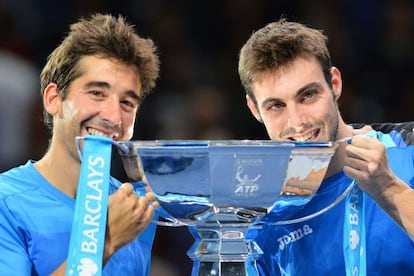Doubles pair makes Finals history
Marc López and Marcel Granollers lift season-ending trophy in London with Davis Cup showdown on horizon

Marc López and Marcel Granollers made history on Monday evening when they became the first Spanish doubles team to lift the ATP World Tour Finals trophy. The nation’s last success in the competition came in 1975, when Juan Gisbert and Manuel Orantes won the now-defunct Masters Grand Prix in Stockholm in a round-robin format.
On order to carve their names in the pantheon of great doubles pairings, López and Granollers were obliged to compete against the discipline’s nobility. Their opening match was against the world number one and two in the doubles ranking, Mike and Bob Bryan, who have a cool 166 titles between them, all but two of which they won in tandem. Against all the odds, the Spanish team defeated the fearsome twins in a tight final-set tiebreak. Next up were Leander Paes and Radek Stepanek, ranked three and four in the world respectively. The Indo-Czech unit ran out straight sets winners.
That left López and Granollers requiring a favor from their victors in the final group stage matches; dispatching the Bryans, which they duly did. The Spaniards kept up their end of the bargain, defeating seventh seeds Aisam-ul-Haq Qureshi and Jean-Julien Rojer, sending both sides through to the semifinals and dumping the all-conquering Americans out of the tournament. Paes and Stepanek were subsequently eliminated by the Indian Express — Rohan Bopana and Mahesh Bhupathi — while López and Granollers saw off the challenge of local favorite Jonathan Marray and Dane Frederik Nielson.
In the final, the Spanish team faced one of the all-time greats in Bhupathi, a career slam doubles winner and owner of 51 titles. However, his partnership with Bopana was not much older than that of López and Granollers, who teamed up definitively in February.
It’s always tough playing them; they’re not a conventional doubles team"
“It’s always tough playing them,” Bhupathi said courtside. “They’re not a conventional doubles team. They make it very, very difficult in more ways than one, no matter who they play.”
“They’re not just serve and volley players, traditional doubles players,” noted Bopana. “They mix a lot. They stay back. They serve and stay back. They cross a lot. They hit different kinds of shots, which is very tough. You’re not sure whether they’re going to come in or cross.”
The first Spaniards to qualify for the season finale since Emilio Sánchez and Sergio Casal in 1994 have one more date on the calendar before hanging their rackets up for the year, and those instincts and ability to pull off the unexpected will be very much needed. The Davis Cup final against the Czech Republic pits them against a probable pairing of Stepanek and the world number six in singles, Tomas Berdych, in Prague.
“It’s the fastest court I’ve played on all year,” said world number five David Ferrer on Tuesday of the Czechs’ selected surface. Spain, led by Àlex Corretja, is seeking its sixth Davis Cup in 12 years against a strong Czech team. The other team members are world number 12 Nicolás Almagro and singles and doubles player Feliciano López, who was instrumental in Spain’s final victory in Argentina in 2008, where he defeated Juan Martín del Potro and partnered Fernando Verdasco to victory over Agustín Calleri and David Nalbandian. The same pair beat Berdych and Stepanek in the 2009 final in Barcelona, where Spain completed a 5-0 whitewash of the Czech team.
Tu suscripción se está usando en otro dispositivo
¿Quieres añadir otro usuario a tu suscripción?
Si continúas leyendo en este dispositivo, no se podrá leer en el otro.
FlechaTu suscripción se está usando en otro dispositivo y solo puedes acceder a EL PAÍS desde un dispositivo a la vez.
Si quieres compartir tu cuenta, cambia tu suscripción a la modalidad Premium, así podrás añadir otro usuario. Cada uno accederá con su propia cuenta de email, lo que os permitirá personalizar vuestra experiencia en EL PAÍS.
¿Tienes una suscripción de empresa? Accede aquí para contratar más cuentas.
En el caso de no saber quién está usando tu cuenta, te recomendamos cambiar tu contraseña aquí.
Si decides continuar compartiendo tu cuenta, este mensaje se mostrará en tu dispositivo y en el de la otra persona que está usando tu cuenta de forma indefinida, afectando a tu experiencia de lectura. Puedes consultar aquí los términos y condiciones de la suscripción digital.








































